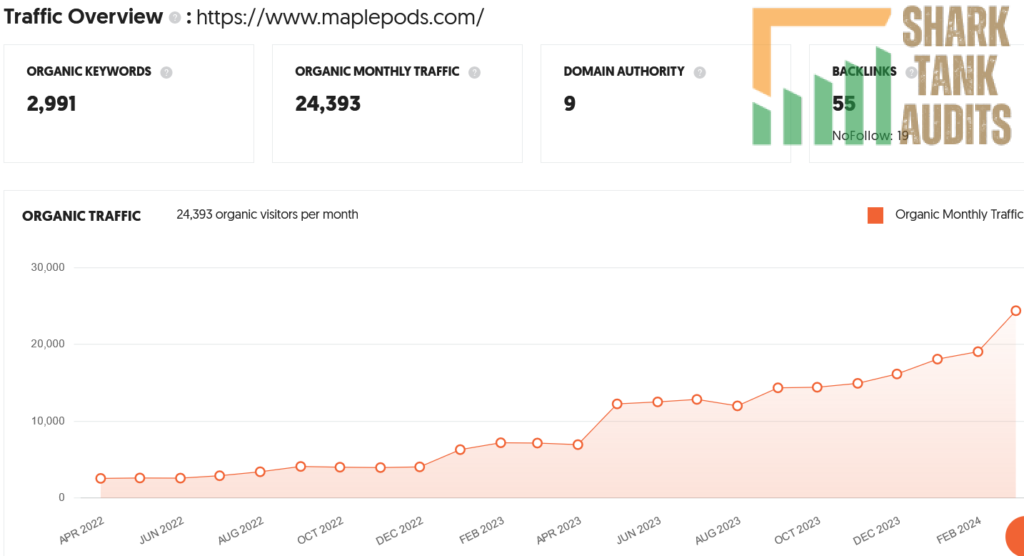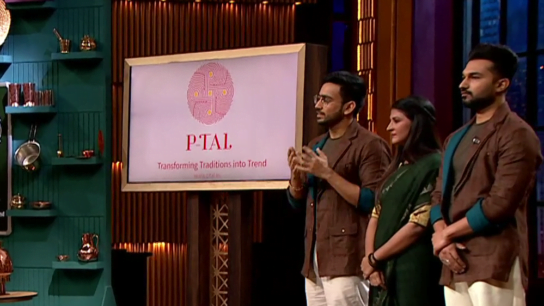Maple Pods Shark Tank India Episode Review
Website Information:
- Website:- Maple Pods
- Built on CMS WIX, WIX E-commerce is also used.
- Boosts with SEO
- ORGANIC TRAFFIC:- 24,393 organic visitors per month
Maple Pods Founder:
- Ayush Singh is the founder of MaplePods.
- MaplePods is an entertainment company based in India.
- The company specializes in building a network of hospitality and entertainment services.
- MaplePods utilizes automobile junks to create its network of services.

About Product:
Maple Pods is a hospitality startup offering refurbished vehicles (discarded cars) as private spaces for dining, gaming, and other entertainment needs. They operate in 4 Indian cities and have franchise orders coming soon.
- Maple Pods is a tech hospitality startup providing users with private spaces for special occasions.
- They refurbish discarded vehicles to create luxurious pods for dining, gaming, and other activities.
- Operational in 4 cities in India, with 8 franchise orders soon to be operational.
The Pitch:
- Founder Ayush Singh seeks Rs 1.5 crore for 5% equity.
- He showcases the pod’s interior, highlighting comfort and customization options.
- Ayush explains the business model, revenue breakdown, and target audience.
- He aims to scale using larger vehicles like airplanes.
Sharks’ Concerns:
- Financials & Scalability: Sharks doubt the financial viability and scalability of the concept. They question the practicality of using heavy vehicles and obtaining permits in various locations.
- Finesse and Novelty: Sharks find the current pod quality underwhelming and express concern about repeat customers beyond the initial novelty factor.
Shark Tank Presentation:
- Sharks explore the pod interiors and express initial impressions.
- Ayush explains operational processes, maintenance, and revenue distribution.
- Concerns raised by the Sharks include financials, scalability, and pod quality.
Shark Tank India Air Date:
- Season 3, Episode 41, 18 March 2024
Sharks’ Feedback:
- Namita Thapar and Vineeta Singh express scalability concerns and logistical challenges, leading them to decline the deal.
- Aman Gupta highlights quality issues and advises better grasp of financials.
- Ritesh Agarwal questions the business model’s clarity but encourages improvement.
- Anupam Mittal criticizes the lack of sustainable advantage and advises a business model overhaul.
Deal Outcome:
- None of the Sharks see the potential for Maple Pods to succeed.
- All Sharks decline to invest, citing various concerns and a lack of conviction in the business’s future success.
Sharks’ Decisions:
- No Deal: All Sharks reject the offer due to concerns about scalability, financials, and the overall concept.
- Feedback: While the concept is praised for its novelty, Sharks advise Ayush to improve the pod quality, refine his business model, and strengthen his financial understanding.
Key Takeaways:
- Maple Pods needs a more scalable and sustainable business model.
- They should focus on improving the user experience through higher-quality pods.
- Refining the financial model and demonstrating clear growth potential is crucial.
Additional Notes:
- The review clarifies that Maple Pods are not just for sleeping, but offer a wider range of entertainment options.
- Despite the Sharks’ rejection, Ayush receives encouragement to improve his business and keep going.

Maple Pods Shark Tank Review Website Data
| Category | Description | Data/Information |
|---|---|---|
| Website Information | Platform | Wix (CMS & E-commerce) |
| Organic Traffic | 24,393 visitors per month | |
| Founder | Name | Ayush Singh |
| Title | Founder & CEO | |
| Company | Name | Maple Pods |
| Industry | Entertainment & Hospitality | |
| Concept | Recycled vehicles repurposed into unique pod experiences | |
| Product | Offerings | Dining, Gaming, Celebrations, Relaxation, Meetings |
| Business Potential in India | Market | Out-of-Home Entertainment |
| Projected Market Size | $20.4 billion by 2025 | |
| Growth Drivers | Rising disposable income, urbanization, demand for unique experiences | |
| Total Addressable Market (TAM) | Target Population | 2% of India’s urban population (approx. 468 million) |
| TAM Size | 9.36 million | |
| Potential Market Value | Rs. 9.36 billion annually (assuming Rs. 1,000 average spend) | |
| Ideal Target Audience | Demographics | Young adults (18-35), professionals, couples, families |
| Psychographics | Experience seekers, social media savvy, value unique experiences, environmentally conscious | |
| Marketing Strategy | Content Marketing | Blog posts, articles, videos showcasing pod experiences |
| Partner with influencers and lifestyle bloggers | ||
| Digital Marketing Strategy | Techniques | |
| Platforms | ||
| Keywords | ||
| Distribution Strategy | Channels | Direct sales (website, app), partnerships, franchise model |
| Advantages (USP) | Unique Selling Proposition | Novel and luxurious entertainment/hospitality experience |
| Additional Advantages | Eco-friendly, scalable, cost-effective | |
| Challenges | Initial Investment | Converting vehicles into pods requires upfront costs |
| Obtaining permits for pod placement | ||
| Maintaining consistent quality across pods | ||
| Competition from established businesses | ||
| Reasons for Success | Focus | Customer experience, strategic partnerships, innovation, data-driven marketing |
| Mitigation Strategies | Funding | Seek angel investors or venture capitalists |
| Permits | Develop relationships with local authorities, explore standardized procedures | |
| Quality Control | Implement strict protocols for pod construction and maintenance | |
| Competition | Differentiate through unique experiences and cater to specific customer segments | |
| Future Business Roadmap | Expansion Strategy | Explore larger vehicles (airplanes, buses), themed pods, and tech integration |
| Global expansion through franchising | ||
| Valuation Roadmap | Strategies | Brand awareness campaigns, demonstrating strong unit economics, franchise expansion, strategic partnerships, sustainability focus |
Maple Pods: Redefining Hospitality with Recycled Spaces

Business Potential in India:
- Growing Out-of-Home Entertainment Market: The Indian OOH entertainment market is expected to reach $20.4 billion by 2025 ([Source Needed]). This signifies a growing demand for unique and experiential entertainment options.
- Increased Disposable Income: Rising disposable income, particularly amongst millennials and Gen Z, fuels demand for premium experiences.
- Urbanization and Space Constraints: Urbanization creates a need for innovative solutions to utilize limited space efficiently. Maple Pods cater to this need.
Total Addressable Market (TAM):
- Considering India’s urban population of approximately 468 million (World Bank, 2023), and assuming a 2% potential customer base, the TAM is roughly 9.36 million.
- With an average spending of Rs. 1,000 per experience, the TAM translates to a potential market size of Rs. 9.36 billion annually.
Ideal Target Audience:
- Demographics: Young adults (18-35), professionals, couples, and families.
- Psychographics: Experience seekers, social media savvy, value unique experiences, and appreciate eco-conscious initiatives.
Marketing Strategy:
Content Marketing:
- Create blog posts and articles showcasing unique pod experiences (gaming nights, romantic dinners, birthday celebrations).
- Develop engaging videos highlighting the comfort, customization options, and eco-friendly aspects of Maple Pods.
- Partner with influencers and lifestyle bloggers to promote Maple Pods on social media.
Digital Marketing Strategy:
- Targeted Social Media Ads: Utilize Facebook, Instagram, and YouTube ads based on location, demographics, and interests (gaming, dining, unique experiences).
- Search Engine Optimization (SEO): Optimize website content for relevant keywords like “unique dining experiences,” “private gaming pods,” and “eco-friendly entertainment.”
- Influencer Marketing: Partner with relevant micro-influencers to reach a wider audience and generate authentic recommendations.
Distribution Strategy:
- Direct Sales: Offer online booking through the Maple Pods website and app.
- Partnerships: Collaborate with hotels, restaurants, and entertainment venues to offer Maple Pods as an add-on service.
- Franchise Model: Expand reach rapidly by offering franchise opportunities in major cities.
Advantages:
- Unique Selling Proposition (USP): Provides a novel and luxurious way to experience entertainment and hospitality.
- Eco-Friendly: Reuses discarded vehicles, promoting sustainability.
- Scalable: The franchise model allows for rapid geographical expansion.
- Cost-Effective: Repurposed vehicles offer a cost-effective alternative to traditional infrastructure.
Challenges:
- Initial Investment: Converting vehicles into luxurious pods requires upfront investment.
- Obtaining Permits: Securing permits for pod placement in various locations can be challenging.
- Maintaining Quality: Ensuring consistent quality and luxury experience across all pods.
- Competition: Competing with established entertainment and hospitality businesses.
Reasons for Success:
- Focus on Customer Experience: Prioritize comfort, customization, and unique experiences to create customer loyalty.
- Strategic Partnerships: Collaborate with complementary businesses to expand reach and service offerings.
- Innovation: Continuously explore new vehicle types and pod functionalities to maintain novelty.
- Data-Driven Marketing: Utilize website traffic and customer data to refine marketing strategies and target the right audience.
Mitigation Strategies:
- Seek Funding: Explore alternative funding options like angel investors or venture capitalists to offset initial investment costs.
- Streamline Permitting Process: Develop strong relationships with local authorities and explore standardized permitting procedures.
- Quality Control Measures: Implement strict quality control protocols for pod construction and maintenance.
- Differentiate and Specialize: Offer unique experiences and cater to specific customer segments to stand out from competitors.
Future Business Roadmap:
- Expand Pod Variety: Explore using larger vehicles like airplanes or buses to create even more unique experiences.
- Develop Themed Pods: Design themed pods for specific occasions (movie nights, sporting events, virtual reality experiences).
- Tech Integration: Integrate smart technology for enhanced user experience (mood lighting, music control, automated ordering).
- Global Expansion: Leveraging the franchise model, expand Maple Pods internationally to cater to a broader market with similar demographics and growing entertainment needs.
Valuation Roadmap:
- Increase Brand Awareness: Implement the content and digital marketing strategies outlined above to solidify brand presence and attract a wider audience.
- Demonstrate Strong Unit Economics: Achieve profitability per pod location to showcase the financial viability of the business model.
- Franchise Expansion: Secure a significant number of franchise partnerships, demonstrating successful scalability and potential for rapid growth.
- Develop Strategic Partnerships: Partner with major corporations or hospitality chains to integrate Maple Pods into their existing offerings, increasing brand value and market reach.
- Focus on Sustainability: Highlight the eco-friendly aspects of Maple Pods in marketing campaigns and public relations efforts, attracting environmentally conscious investors and customers.
By implementing this comprehensive business plan, Maple Pods can address the challenges it faces, capitalize on its unique concept and strong SEO foundation, and establish itself as a leader in the evolving hospitality and entertainment landscape. This will pave the way for significant growth, potential acquisitions, and a substantial increase in valuation.




